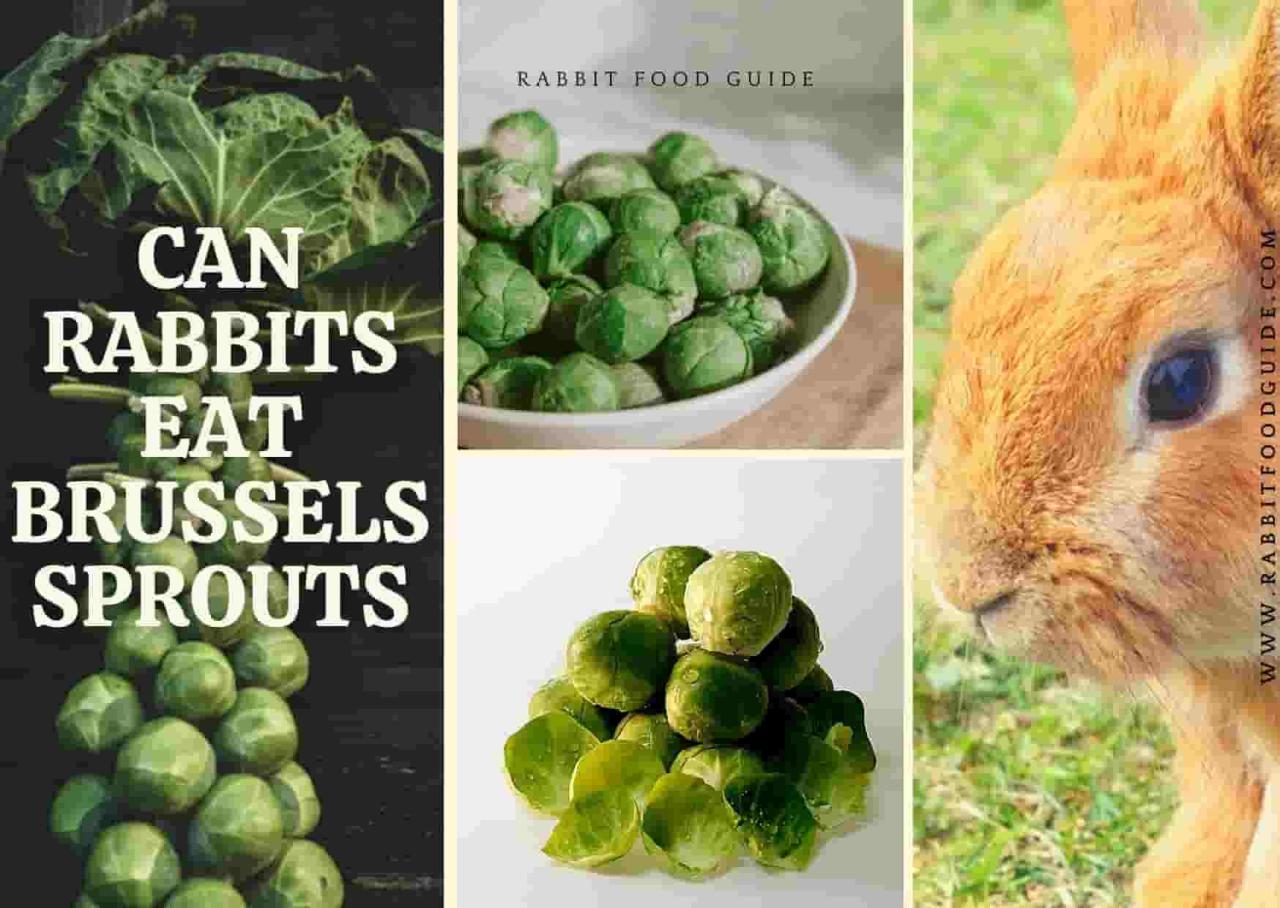Brussels sprouts, a member of the cruciferous vegetable family, are a nutritious and versatile food option for humans. But can rabbits enjoy this leafy green as well? In this article, we’ll delve into the nutritional value, digestive effects, and safe consumption guidelines for Brussels sprouts as they pertain to rabbits.
We’ll also explore potential health concerns and provide a list of alternative vegetables that are safe and nutritious for your furry friend.
Brussels sprouts are a nutrient-rich vegetable that can provide rabbits with essential vitamins, minerals, and antioxidants. They are a good source of vitamin C, vitamin K, and fiber, which are all important for maintaining a healthy rabbit. Vitamin C is essential for immune system function, vitamin K is important for blood clotting, and fiber aids in digestion.
Nutritional Value of Brussels Sprouts
Brussels sprouts are a cruciferous vegetable packed with essential vitamins, minerals, and antioxidants. They are a rich source of vitamin C, vitamin K, and folate. They also contain significant amounts of fiber, potassium, and manganese.Brussels sprouts are a low-calorie food, with only 38 calories per cup.
They are also a good source of protein, with 3 grams per cup.The following table compares the nutritional value of Brussels sprouts to other cruciferous vegetables:| Nutrient | Brussels sprouts | Broccoli | Cauliflower | Cabbage ||—|—|—|—|—|| Calories | 38 | 31 | 25 | 22 || Protein (g) | 3 | 2.6 | 2 | 1.3 || Fiber (g) | 4 | 2.4 | 2 | 1.2 || Vitamin C (mg) | 85 | 93 | 51 | 37 || Vitamin K (mcg) | 137 | 106 | 48 | 41 || Folate (mcg) | 65 | 57 | 51 | 35 || Potassium (mg) | 316 | 286 | 226 | 196 || Manganese (mg) | 0.2 | 0.1 | 0.1 | 0.1 |As you can see, Brussels sprouts are a nutrient-rich vegetable that offers a variety of health benefits.
They are a good source of vitamins, minerals, and antioxidants, and they are also a low-calorie food.
Digestive Effects of Brussels Sprouts on Rabbits
Brussels sprouts are a cruciferous vegetable that is rich in fiber and other nutrients. These nutrients can provide several digestive benefits for rabbits, including:
- Providing fiber: Fiber is an essential part of a rabbit’s diet. It helps to keep the digestive system moving and prevents gastrointestinal issues such as constipation and diarrhea.
- Supporting gut health: The fiber in Brussels sprouts can also help to support the growth of beneficial bacteria in the gut. These bacteria help to break down food and absorb nutrients, and they also play a role in immune function.
Safe Consumption Guidelines for Rabbits
Brussels sprouts are a nutritious treat for rabbits, but moderation is key. Safe consumption guidelines help prevent digestive issues and ensure a healthy diet.
Introduce Brussels sprouts gradually, starting with a small piece (1-2 leaves) and monitoring for any adverse reactions. If no issues arise, you can gradually increase the serving size.
Frequency and Serving Size
- Adult rabbits: 1-2 leaves per week
- Young rabbits (under 6 months): Avoid Brussels sprouts until their digestive systems mature
Remember, these guidelines are general recommendations. Adjust serving sizes and frequency based on your rabbit’s individual needs and tolerance.
Potential Health Concerns
Excessive consumption of Brussels sprouts can lead to digestive issues in rabbits, primarily due to the presence of glucosinolates. These compounds break down into isothiocyanates during digestion, which can irritate the digestive tract and cause gas and bloating.
Gas and Bloating
Glucosinolates are found in all cruciferous vegetables, including Brussels sprouts, broccoli, and cauliflower. When these compounds are broken down, they release gases that can cause discomfort and bloating in rabbits. The severity of these symptoms can vary depending on the amount of Brussels sprouts consumed and the individual rabbit’s digestive system.
Alternative Vegetables for Rabbits

In addition to Brussels sprouts, several other vegetables offer nutritional value for rabbits. These alternatives provide varying levels of vitamins, minerals, and fiber, complementing a balanced diet.
Leafy Greens
Leafy greens, such as romaine lettuce, kale, and spinach, are excellent sources of fiber and essential vitamins. They contain vitamins A, C, and K, which support eye health, immune function, and blood clotting. Compared to Brussels sprouts, leafy greens are generally lower in calories and carbohydrates, making them a suitable option for weight management.
Herbs
Fresh herbs, such as basil, cilantro, and parsley, provide a rich source of antioxidants and phytonutrients. These compounds have anti-inflammatory properties and support overall health. While not as high in fiber as other vegetables, herbs offer a flavorful addition to a rabbit’s diet.
Root Vegetables
Root vegetables, including carrots, parsnips, and turnips, are rich in beta-carotene, an antioxidant that converts to vitamin A in the body. They also provide dietary fiber, potassium, and vitamin C. While carrots are higher in sugar than other root vegetables, they remain a healthy treat for rabbits in moderation.
Other Vegetables
Other safe and nutritious vegetables for rabbits include:
- Bell peppers: Rich in vitamin C and antioxidants
- Broccoli: Provides vitamins A, C, and K, as well as fiber
- Cucumbers: High in water content and low in calories
- Asparagus: Good source of fiber, folate, and vitamins A and K
Final Conclusion
In conclusion, Brussels sprouts can be a healthy and nutritious addition to a rabbit’s diet when fed in moderation. However, it is important to introduce them gradually and monitor your rabbit for any adverse reactions. If you have any concerns about feeding Brussels sprouts to your rabbit, it is always best to consult with a veterinarian.
Q&A
Can rabbits eat Brussels sprouts raw?
Yes, rabbits can eat Brussels sprouts raw. However, it is important to wash them thoroughly before feeding them to your rabbit.
How often can rabbits eat Brussels sprouts?
Rabbits can eat Brussels sprouts 2-3 times per week.
What are some alternative vegetables that are safe for rabbits?
Some alternative vegetables that are safe for rabbits include carrots, celery, dandelion greens, and romaine lettuce.